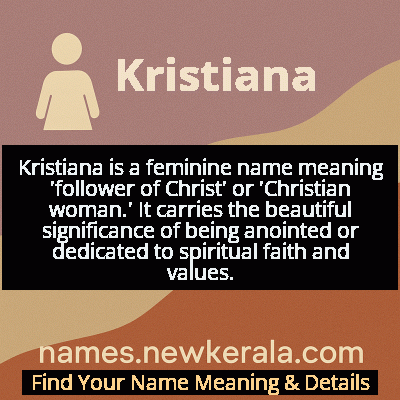Kristiana Name Meaning & Details
Origin, Popularity, Numerology Analysis & Name Meaning of Kristiana
Discover the origin, meaning, and cultural significance of the name KRISTIANA. Delve into its historical roots and explore the lasting impact it has had on communities and traditions.
Name
Kristiana
Gender
Female
Origin
Christian
Lucky Number
3
Meaning of the Name - Kristiana
Kristiana is a feminine name meaning 'follower of Christ' or 'Christian woman.' It carries the beautiful significance of being anointed or dedicated to spiritual faith and values.
Kristiana - Complete Numerology Analysis
Your Numerology Number
Based on Pythagorean Numerology System
Ruling Planet
Jupiter
Positive Nature
Optimistic, inspirational, and creative.
Negative Traits
Scattered, exaggerating.
Lucky Colours
Yellow, gold, purple.
Lucky Days
Thursday.
Lucky Stones
Yellow sapphire.
Harmony Numbers
1, 2, 9.
Best Suited Professions
Arts, writing, communication.
What People Like About You
Creativity, optimism.
Famous People Named Kristiana
Kristiana Gregory
Author
Award-winning children's historical fiction writer
Kristiana Pärn
Model
Internationally recognized fashion model for major design houses
Kristiana Paić
Athlete
Professional handball player representing Croatia internationally
Kristiana Pettersson
Musician
Swedish singer-songwriter with multiple album releases
Name Variations & International Equivalents
Click on blue names to explore their detailed meanings. Gray names with will be available soon.
Cultural & Historical Significance
Extended Personality Analysis
Individuals named Kristiana are commonly associated with a blend of spiritual depth and practical wisdom. They often exhibit strong intuitive abilities and emotional intelligence, allowing them to navigate complex social situations with grace and understanding. Their inherent compassion frequently draws them toward helping professions or volunteer work, where they can make meaningful differences in others' lives. Kristianas typically possess excellent communication skills, expressing themselves clearly while also being attentive listeners who make others feel heard and valued. They tend to approach life with a balanced perspective, combining idealistic aspirations with realistic assessment of situations. This equilibrium often makes them trusted advisors and reliable friends who offer thoughtful guidance without being judgmental. Their strength of character is usually matched by artistic sensitivity, with many Kristianas expressing themselves through creative pursuits like writing, music, or visual arts. They generally value authenticity in relationships and strive to maintain integrity in all aspects of their lives, creating lasting bonds built on mutual respect and genuine connection.
Modern Usage & Popularity
In contemporary naming practices, Kristiana occupies a unique position as a name that feels both classic and fresh. Its usage has remained relatively stable rather than following dramatic popularity trends, making it a reliable choice that avoids being dated or overly common. The name sees strongest usage in European countries with Christian heritage, particularly in Scandinavia, Eastern Europe, and among diaspora communities. In English-speaking countries, it's often chosen by parents seeking a name with clear religious significance that also has international appeal and elegant sound. The name's adaptability to various cultural contexts and its multiple nickname possibilities contribute to its continued relevance. Recent years have seen some resurgence in traditional names with religious meanings, positioning Kristiana well for parents interested in names that honor heritage while fitting modern sensibilities. Its cross-cultural recognition and ease of pronunciation across multiple languages make it particularly suitable for families with international connections or multicultural backgrounds.
Symbolic & Spiritual Meanings
Symbolically, Kristiana represents the embodiment of Christian virtues in daily life, serving as a living testament to faith in action. The name evokes images of spiritual guidance and moral leadership, suggesting someone who illuminates truth through example rather than proclamation. Metaphorically, it signifies the integration of divine purpose with human experience, representing the concept of grace manifested in ordinary circumstances. The name also carries connotations of resilience and renewal, reflecting the enduring nature of spiritual values across generations and cultural changes. In symbolic terms, Kristiana suggests a bridge between tradition and progress, honoring historical roots while embracing contemporary understanding. It represents the idea that true strength often appears as gentle persistence rather than forceful dominance, and that lasting influence comes through consistent integrity rather than temporary power. The name embodies the paradox of being both anchor and sail—providing stability while moving forward with purpose.

